
Justice declares fourteen pro-democracy activists “guilty” of sabotage

On Thursday, May 30, Hong Kong justice announced the arrest of fourteen pro-democracy activists “sinner” From sabotage. This is the largest prosecution against democracy supporters in the financial center since Beijing introduced the national security law there. It is also the largest case so far linked to this law passed in mid-2020 that crushed all opposition in Hong Kong following major, sometimes violent, pro-democracy demonstrations in 2019 in this southern Chinese territory.
In total, authorities charged 47 prominent opposition figures from across the political spectrum “Conspiracy for sabotage purposes”Claiming that their political activities aim to overthrow the government. On Thursday, the courts ruled on the case of the 16 defendants who, out of 47, pleaded not guilty.
High Court Judge Andrew Chan on Thursday refused to name fourteen defendants convicted of subversion, including former MP Leung Kwok Hong (nicknamed “ long hair “, “Long Hair”) and Ray Chan, as well as former journalist Gwyneth Ho. On the other hand, the court found two former district council members not guilty. The ruling is expected later this year.
The alleged acts are punishable by life imprisonment
The convicted activists planned to undermine the government's authority, and “In our view, this would have led to a constitutional crisis in Hong Kong.”, written by three carefully selected justices of the Supreme Court. Most of the accused have been behind bars since 2021.
They are all charged in 2021 with “Conspiracy to commit acts of sabotage”which are acts punishable by life imprisonment, after it organized an unofficial primary election a year ago aimed at selecting opposition candidates for the legislative elections.
Their goal was to gain a majority in the city's partially elected assembly, in order to veto budgets and perhaps force Hong Kong's then-pro-Beijing leader, Carrie Lam, to resign, according to attendees.
The defense argued that the Basic Law of the Hong Kong Special Administrative Region, which serves as the constitution, provided the mechanisms enabling this project, and it was therefore a matter“It is a purely political issue, not a legal issue.”.
The trial was held without a jury, a departure from Hong Kong's judicial tradition. However, this issue has been closely followed by the international community. Diplomats from the French and Italian consulates and others from the European Union visited the court on Thursday. The United States and other Western countries have criticized Beijing, saying it is reducing freedoms promised when the former British colony was handed over to China in 1997.
US sanctions
The arrest in January 2021 of the main defendants, including Leung Kwok Hong, lawyer Benny Tai and former pro-democracy lawmaker Claudia Mo, prompted the United States to impose sanctions on six Chinese and Hong Kong officials. Benny Tai and Claudia Mo decided to plead guilty. The US Consul General in Hong Kong, Gregory May, announced in May that Washington would do so “Careful monitoring of expected sentences and convictions”.
Universal application
Morning world
Every morning, find our selection of 20 articles not to be missed
Download the app
Hong Kong police announced this week that they had arrested seven people in two days over a Facebook post “Messages of an inflammatory nature”. These arrests are the first in relation to a new national security law that came into effect in March, and provides for prison sentences of up to life for five categories of crimes, including treason, rebellion, espionage, sabotage, and foreign interference.
This provision also removed the possibility of a one-third sentence reduction due to good behavior for people convicted on national security grounds, dealing a blow to the 31 pro-democracy defendants who chose to plead guilty in the hope of possible early release. .

“Unapologetic pop culture trailblazer. Freelance troublemaker. Food guru. Alcohol fanatic. Gamer. Explorer. Thinker.”
